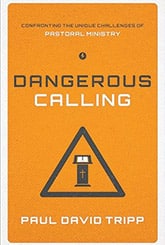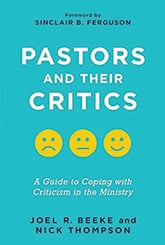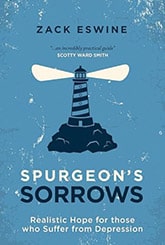Dangerous Calling: Confronting the Unique Challenges of Pastoral Ministry
(Crossway, 2012) by Paul David Tripp
 If I could assign every young pastor and every local church member to read one book on ministry with the promise they’d work through it entirely, it would be this book. When I first read it a decade ago during my first full-time pastorate, I was both encouraged and strengthened in my person and ministry, even though the author makes clear in the introduction that encouragement is not the book’s main purpose.
If I could assign every young pastor and every local church member to read one book on ministry with the promise they’d work through it entirely, it would be this book. When I first read it a decade ago during my first full-time pastorate, I was both encouraged and strengthened in my person and ministry, even though the author makes clear in the introduction that encouragement is not the book’s main purpose.
Writes Tripp, “This is a diagnostic book. It is written to help you (the pastor) take an honest look at yourself in the heart-and-life exposing mirror of the Word of God — to see things that are wrong and need correcting and to help you place yourself once again under the healing and transforming power of the gospel of Jesus Christ.” There it is, that’s what I needed, and it’s exactly why I was encouraged. Tripp gave an honest assessment of the often gut-wrenching nature of ministry and showed me how it had potential to either sanctify me or drive me out of ministry. It was a life-changing book for me that helped me see the many ugly, multi-headed hydra of pride, arrogance, presumption and other sins that still slithered around in my heart and must be slayed if I would remain faithful in ministry. Every pastor needs to hear this message.
I would have every church member read the book because Tripp shows what a difficult — and sometimes glorious — calling the pastoral ministry is for a mere man.
If you want to understand how dangerous pastoral culture can be as a pastor or as one who has a pastor, get this book, read and heed it.
Pastors and Their Critics: A Guide to Coping with Criticism in the Ministry
(P&R, 2020) by Joel Beeke and Nick Thompson
 It could be written out as an axiom: Every man who spends more than a week as pastor of a church will face criticism.
It could be written out as an axiom: Every man who spends more than a week as pastor of a church will face criticism.
Some won’t like your preaching; they’ll say it’s dry as Ezekiel’s bones and boring as a chemistry lecture or it doesn’t have enough homespun stories or it has too many homespun stories, it doesn’t include enough theology or it’s way too theological. You’re too deep. You’re too shallow.
Some will complain that your sermons are too long. Though it’s probably as rare as a frosty July day in Charleston, a few may even bellyache that they’re too short. In pastoral ministry, like most all vocations, you will hear complaints. But how will you deal with them? This book gives deep biblical insight into how you should handle both your critics and their sentiments (even painful ones) in a gracious way that exemplifies the Lord Jesus Christ.
Spurgeon’s Sorrows: Realistic Hope for Those Who Suffer from Depression
(Christian Focus, 2014) by Zack Eswine
 Only the grace of God can explain the superhuman ministry of Charles Spurgeon.
Only the grace of God can explain the superhuman ministry of Charles Spurgeon.
His ministry in 19th century London was both local and global — and remains so 130 years after his death.
He often preached 10 times per week at the Tabernacle and in other places. Spurgeon (1834–1892) led evangelistic activities between services on Sunday afternoons and weekday evenings. Then there were the many institutions and activities at the downtown London church that received input from the great pastor. Spurgeon also suffered from grinding bouts of deep depression and anxiety. Thankfully, he wrote and preached about it because he knew many other fallen people suffered from those maladies as well.
Eswine outlines Spurgeon’s struggle with depression, quoting judiciously from his sermons and ultimately using the legendary pastor as a case study and manual for giving instruction on how to deal with this far-too-common ailment among God-called men.
The Book Your Pastor Wishes You Would Read (But is Embarrassed to Ask)
(The Good Book Company, 2019) by Christopher Ash
 What do you think about your pastor? Do you chew over his sermons and wonder if they are clear and helpful? Do you feel he spends enough time with you? In fact, do you ever catch yourself wondering what he does all day?
What do you think about your pastor? Do you chew over his sermons and wonder if they are clear and helpful? Do you feel he spends enough time with you? In fact, do you ever catch yourself wondering what he does all day?
The truth is, often we think, “What can my pastor do for me?” Far less often do we think, “What can I do for my pastor?”
Seasoned former pastor, Christopher Ash, urges church members to think about pastors not just in terms of what they do — how they lead and pray and preach and teach and so on — but about who they are. He encourages us to remember that pastors are people and to pray for them as they serve us.

